15 May 2014 | News and features, Politics and Society, United Kingdom
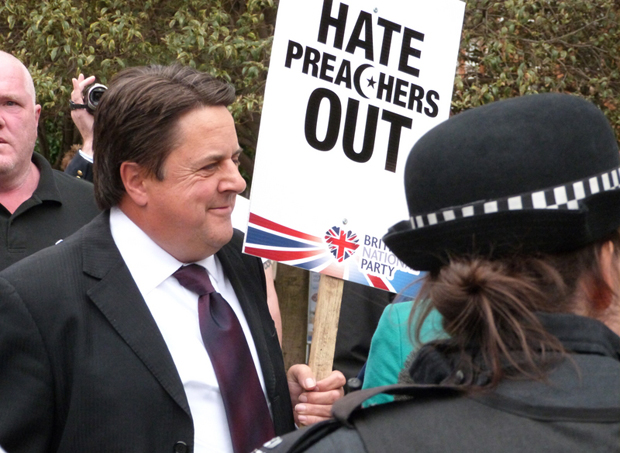
Nick Griffin, leader of the British National Party, arrives at a protest in June 2013 in Westminster. (Photo: Paul Smyth / Demotix)
BBC Radio Five Live’s Breakfast yesterday dutifully carried out its public service remit by interviewing Nick Griffin, the world’s most tedious Nazi demagogue, ahead of the European elections. Griffin’s British National Party does have some seats in the European Parliament, so is entitled to some airtime.
It was a dull interview. They always are. The BBC interviewers–in this case, Nicky Campbell–want to pick away at the BNP facade, but always somehow miss out on the really strange stuff. Long ago, I vowed that I would never write about Griffin without pointing out that he had written a pamphlet called “Who Are The Mindbenders?”, which is a catalogue of Jewish and Jewish people who work in the media. Griffin believes that these evil Jews (sorry, “Zionists”) are involved in an enormous plot to keep him–the saviour of the white race–out of the press and off the airwaves.
The conspiracist aspect of BNP policies is often overlooked, with the straightforward racism critiqued more heavily. So it was here. Campbell asked Griffin if he had a problem with black and mixed-race players representing England in the upcoming World Cup. Griffin, barely missing a beat, started complaining about BBC liberals smearing him and worse, denying him airtime.
“The BBC owes me 12 Question Times,” he declared, bemoaning his lack of invitations to appear on the BBC’s Thursday night festival of shouting from and at the telly.
It might have been interesting to delve into why Griffin felt he was being kept off Question Time, to see how long he would be able to maintain a line before going full Doctor Strangelove. As it was, we got only the superficial whine. The whine of the martyr-bully.
It is the background sound of our time. There is absolutely no one engaged in modern public life at any level at all who has not complained that they’ve been silenced, denied a platform, bullied into submission by a cruel cabal of agents of reaction or “the liberal agenda”, take your pick.
That is not to say people are not censored, even in the lovely modern 21st Century. It happens, quite a bit. People get locked up for saying stupid things on the internet that affront public sentiment. For years the libel laws restrained reporters, reviewers and the man on the Clapham Omnibus from saying what they really knew, or thought, or thought they knew. And no reader of this site needs to be told what happens in the less than democratic countries all over the world.
But there is actual censorship, and there is the claim to being censored, which are often two separate things. The BNP’s Griffin, UKIP’s Nigel Farage, and every Blimp all the way to Westminster delights in telling us, at length, the things that nobody, least of all them, is allowed to talk about anymore.
Meanwhile, on the left and the pseudo-left, there is an obsession with “platforms”; who has one, who deserves one, who is denied one. Editors and writers who do their best to represent as many diverse views as possible are denounced routinely for the articles they haven’t published rather than the ones they have. Every oversight is evidence of a conspiracy rather than a cock-up. The right people are always being excluded by the wrong people. If only, if only everyone shut up and let me speak, we think, then I could sort everything out.
It’s ironic that many of those who argue most vehemently that they are being censored are the exact ones who demand everyone else shut up. Intersectional feminists who insist they are being excluded from debate demand that radical feminists be “no platformed”. Ukipers who claim they’re not allowed talk about immigration want the police to arrest their opponents in anti-racist movements. All of them, simultaneously, noisily, will end up invoking Niermoller’s “First they came for…” (with the possible exception of the BNP, who, stopping short of displaying sympathy with Communists or Jews, instead content themselves with calling their opponents “the real fascists”, as I once heard Griffin do at Oxford Union).
Why is this? Why does everyone want to be censored?
It’s possible that the simple reason is that we are constantly improving as a society. Triumphalism and privilege are pretty much taboo for many. On the face of it, most of the people reading this, and certainly the person writing it, are probably the luckiest sons of bitches to ever have walked the earth. But a combination of our still-relevant horror at the great wars of the last century, plus a greater ability to learn about the ideas and experiences of others, make most of us wary of revelling in our role as the victor. Instead, we prefer to be the underdog, because underdogs are more virtuous–victims rather than perpetrators. Martyrs, even.
The Nazis and Communists of the 20th century also believed they were more sinned against than sinning, but the difference was that they were certain they would show the world who was really boss. Now, no one outside the most extreme movements – Al Qaeda; or North Korean Juche – really wants to state that aim openly. We want to remain oppressed. Censorship is considered almost universally as a bad thing, so people on whom it is inflicted are good.
The background whine of censorship, emanating even from the powerful may just be the tiny price we pay for a world that is generally better and kinder.
I think we can live with that.
This article was posted on May 15, 2014 at indexoncensorship.org
29 Nov 2013 | Academic Freedom, News and features, United Kingdom
In bid to address the issues surrounding people with extremist views giving talks at British campuses, Universities UK recently released new guidelines on external speakers. “Universities have to balance their obligation to secure free speech with their duties to ensure that the law is observed — which includes promoting good campus relations and maintaining the safety and security of staff, students and visitors,” says the body, which represents vice-chancellors.
This is not the first time they have spoken out about the topic. However, a set of guidelines from 2011 reads: “It is the law alone which can set restrictions on freedom of speech and expression and on academic freedom — it is for the law and not for institutions or individuals within institutions to set the boundaries on the legitimate exercise of those rights”. It appears they are calling for somewhat stricter regulation this time around. The current guidelines are also more in line with the view of the National Union of Students, which maintains that “(…) many students’ unions may wish to go further than the law on securing ‘freedom from harm’ when restricting some speaker activity.” The NUS’ own “No Platform” policy, banning certain speakers from their events, puts this theory into practice.
This is one of those topics that seems to come up at fairly regular intervals, and the outline of the debate is familiar by now. One side argues that speakers with outwardly hateful or discriminatory views don’t deserve a platform through which to legitimate them; while the other side argues that to deny them this is to deny them the right to freedom of expression, which also extends to those with whom we disagree. The following speakers have been responsible for at one point reigniting the debate, each in their own way.
1) Nick Griffin
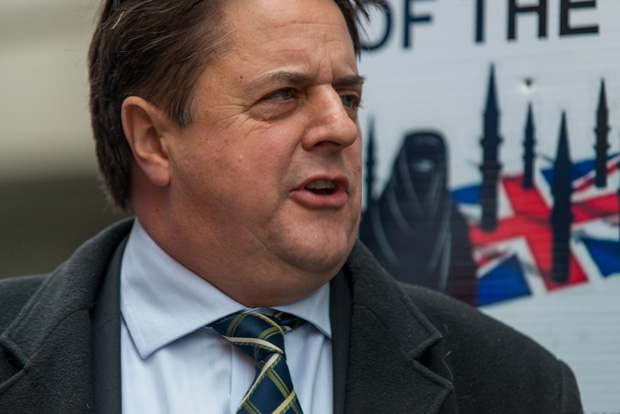
Nick Griffin outside the Old Bailey court on the first day of the trial of the murder of Lee Rigby (Image: Velar Grant/Demotix)
The most famous case in recent years was the 2007 appearance of BNP leader Nick Griffin (and Holocaust-denying historian David Irving) at an Oxford Union debate on free speech. The invitation caused massive uproar, with protesters picketing the event. “It is not just an Oxford issue, this will have ramifications for other places where the BNP are active… this is going to give legitimacy and credibility to their views,” said Student Union President Martin McClusky at the time. “I find the views of the BNP and David Irving awful and abhorrent but my members agreed that the best way to beat extremism is through debate,” argued Oxford Union president Luke Tryl. This is not only time the Nick Griffin has caused controversy as a potential university speaker. Trinity College Dublin cancelled plans to include him in a debate immigration, saying “it could not guarantee the safety and wellbeing of staff and students”.
2) Mufti Ismail Menk

Mufti Ismail Menk giving a lecture (Image: soukISLAM/YouTube)
Islamic preacher Mufti Ismail Menk spoke at Liverpool University earlier this month. He has previously stated that gay people are “filthy” and “worse than animals”. The event was initially reported to be part of a longer tour stopping at Glasgow, Leeds, Liverpool, Leicester, Cardiff and Oxford universities. However, all except Liverpool, where he was hosted by the Islamic Society, revoked their invitation or said he had not been officially invited in the first place. Liverpool responded that it is “not the role of the university to censor people’s views”.
3) Mohamed El-Nabawy
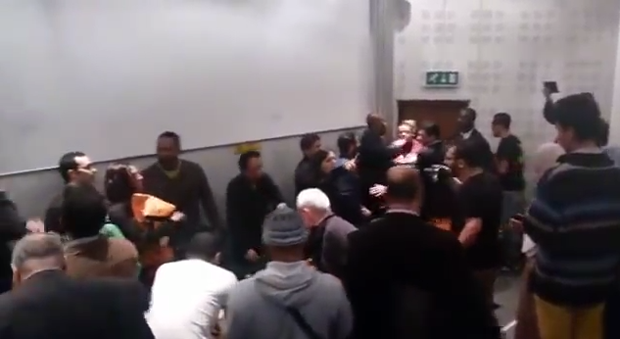
A video captured the protest that erupted when Mohamed El-Nabawy was due to speak at SOAS (Image: YouTube)
A representative of Tamaroud, the grassroots movement which played a significant role in the ousting of Egypt’s Muslim Brotherhood-backed elected government, was chased away by angry protesters prior to a scheduled talk at London’s School of Oriental and African Studies (SOAS). The protesters, who were not students, chanted and brandished posters associated with the Muslim Brotherhood at the open lecture. SOAS security had to escort El-Nabawy off campus using an emergency exit . A spokeswoman for the Palestinian Society, which had organised the talk, said: “In the pursuit of freedom of speech and expression, some people may find some of the views expressed at our events objectionable.”
4) David Gale
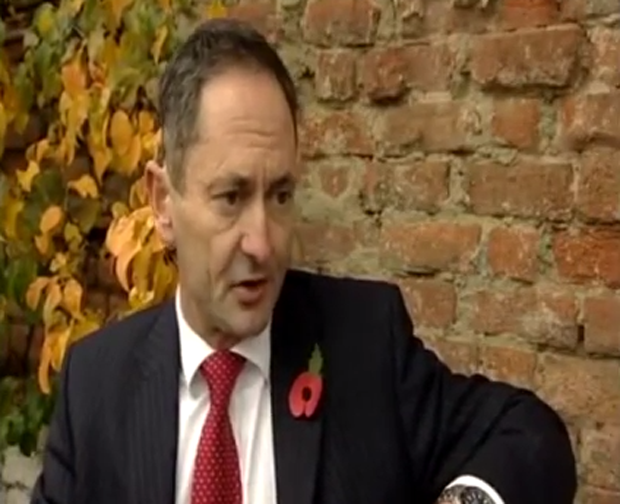
David Gale on the BBC’s Sunday Politics Show (Image: UKIPDerby/YouTube)
In 2012 the Student Union at the University of Derby banned David Gale, UKIP’s candidate for Police and Crime Commissioner, from taking part in a Q&A session at the university. The Union has a no platform policy for “individual(s) who they believe to be a member of a group with racist, fascist or extremist views”, a category the Union believed was applicable to UKIP . UKIP leader Nigel Farage weighed in on the issue at the time, saying: “It is frightening that a Derby student body is so frightened of free speech and public opinion.”
5) George Galloway
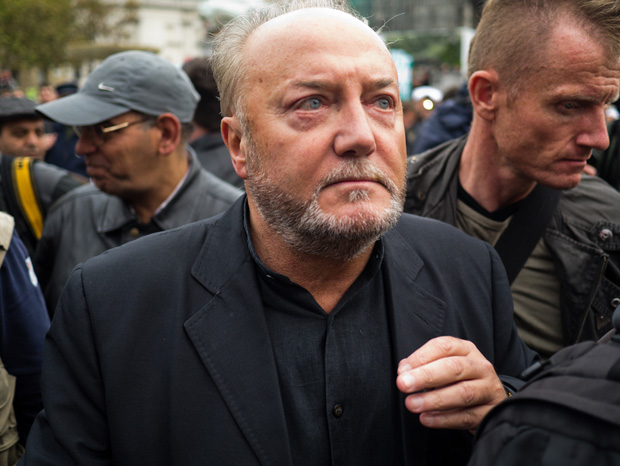
George Galloway attends an anti-war rally in 2011 (Image: Paul Soso/Demotix)
In March, George Galloway was set to speak at an event organised by the University of Chester Debating Society. However, the invitation was revoked by the Student Union, acting in line with the NUS’ No Platform policy on Galloway. This move came after the Respect Party MP was involved in a string of controversial incidents, including refusing to debate with an Israeli student at an Oxford University panel discussion. Galloway’s camp have called the policy “idiotic, anti-democratic and politically-motivated”.
6) Julie Bindel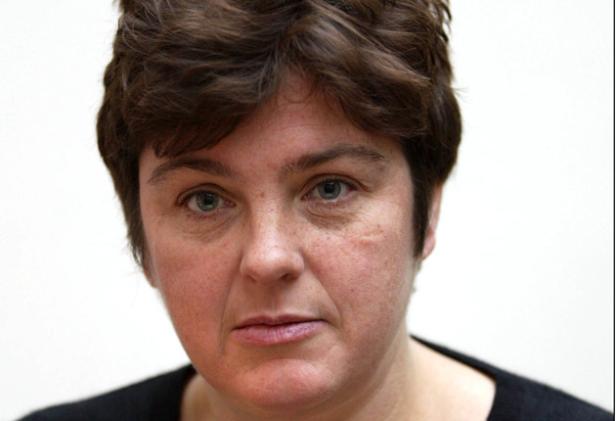
In September, the Debating Union at Manchester University (MDU) invited feminist writer and campaigner Julie Bindel to speak at their discussion on pornography. A number of people objected due to Bindel’s reported views about transexual people, which have led to the NUS implementing a No Platform policy for her. Some transexual students and their supporters “felt Julie Bindel’s transphobic statements and views made them both unwelcome at the event, and unsafe on campus, as it seemed that transphobia was being allowed and possibly encouraged,” said Loz Webb, the university’s Trans* representative. Despite this, MDU refused to replace Bindel, though she eventually chose to drop out after receiving death threats.
This article was originally posted on 29 Nov 2013 at indexoncensorship.org
22 Jul 2010 | Uncategorized
James MacIntyre at the New Statesman is, er, a little unhappy at Nick Griffin’s appearance at Buckingham Palace for the Queen’s garden party today.
When it emerged that British National Party leader and author of “Who Are The Mindbenders” Nick Griffin had been invited to a garden party at Buckingham Palace, I was invited to defend the decision on BBC Radio Five Live. The former Labour MEP I discussed the topic with was shocked — shocked! — by this outrageous insult to the Queen’s Black, Asian and minority ethnic subjects — especially those serving in the armed forces.
The argument against Griffin attending functions such as this is almost compelling: post-Empire, Britain’s over-riding narrative is the defeat of Nazi Germany. Witness the dismay at David Cameron’s truthful description of the UK as a “junior partner” in World War II. While it’s plainly true that the UK could not have survived without logistical support from the US pre-1941, and the Nazis would not have been defeated without US troops post-1941, for even the most unpatriotic Britons it still seems beyond the pale to suggest that the war was won by anyone other than a few plucky Spitfire pilots flying out of Biggin Hill. Maybe with some help from the Russians, at a push.
Griffin’s status as leader of Britain’s most prominent neo-fascist party clearly makes his invitation to the Palace a problem.
But if MEPs are to be invited to the Queen’s house for tea as a matter of protocol, as the palace claims, then a snub of Griffin would be far more problematic.
The BNP is a legal political party. Should the palace deny a member of a legal political party the same privilege it extends to others, the monarchy immediately becomes politicised. Undesirable, and constitutionally problematic.
So, you have two choices: ban the BNP (not a move I could ever support), or, sooner or later, let Nick Griffin eat a few cucumber sandwiches in the garden of Buckingham palace. It would seem the palace has made the decision to get this one out of the way.
Update: Channel 4 News is reporting that Griffin was refused entry to Buckingham Palace after he “overtly used his invitation for political purposes”
This I find problematic. While it’s obvious from a cursory glance that Griffin is using his invitation as vindication, (“…I will be there for the one million British patriots who now vote for this party despite all the hate from the media liars, the old parties and their thuggish far-left allies.”), aren’t people in Griffin’s position as MEP invited exactly because they are elected? Implying they are representing the people voting for them?
By pointing out Griffin’s politicisation of the event, has the palace allowed itself to become politicised?
22 Oct 2009 | Uncategorized
Was this a great day for democracy, I was asked this morning as I sought for the umpteenth time on television and radio to justify the BBC’s decision to invite the BNP onto its Question Time programme. Of course it is not a great day when a party that is avowedly hostile to ethnic minorities is given a platform on the broadcaster’s most prestigious discussion programme. This is not a day that will be remembered with fondness by anyone except supporters of the far-right party.
And yet the alternative for democracy and for free speech – the most basic of civil liberties – would have been worse. The most important free expression is the right of an individual or organisation, whose views one finds most obnoxious, to have its say. One works from the assumption that Nick Griffin, the BNP leader, will be subjected to robust, passionate and forensic cross-examination. The rest is up to the good sense of the public.
The only realistic and practical criteria for curbing free speech reside in the law. If Griffin or any of his followers break the law – as they have done in the past – then they should be subjected to the full might of the law. Until or unless they do, they are entitled to be heard no matter how uncomfortable that leaves mainstream society.
It is not for governments, less still public service broadcasters, to determine the acceptability of opinion. When in February Jacqui Smith, the then Home Secretary, announced a list of 16 undesirable foreigners who would be denied access to the UK – from the Dutch far-right politician Geert Wilders to radical Islamist preachers to an American shock-jock radio host – she was setting a worrying precedent. One is either a free individual or guilty of a crime. That is surely one of the most important lessons of our, imperfect, democratic system.







